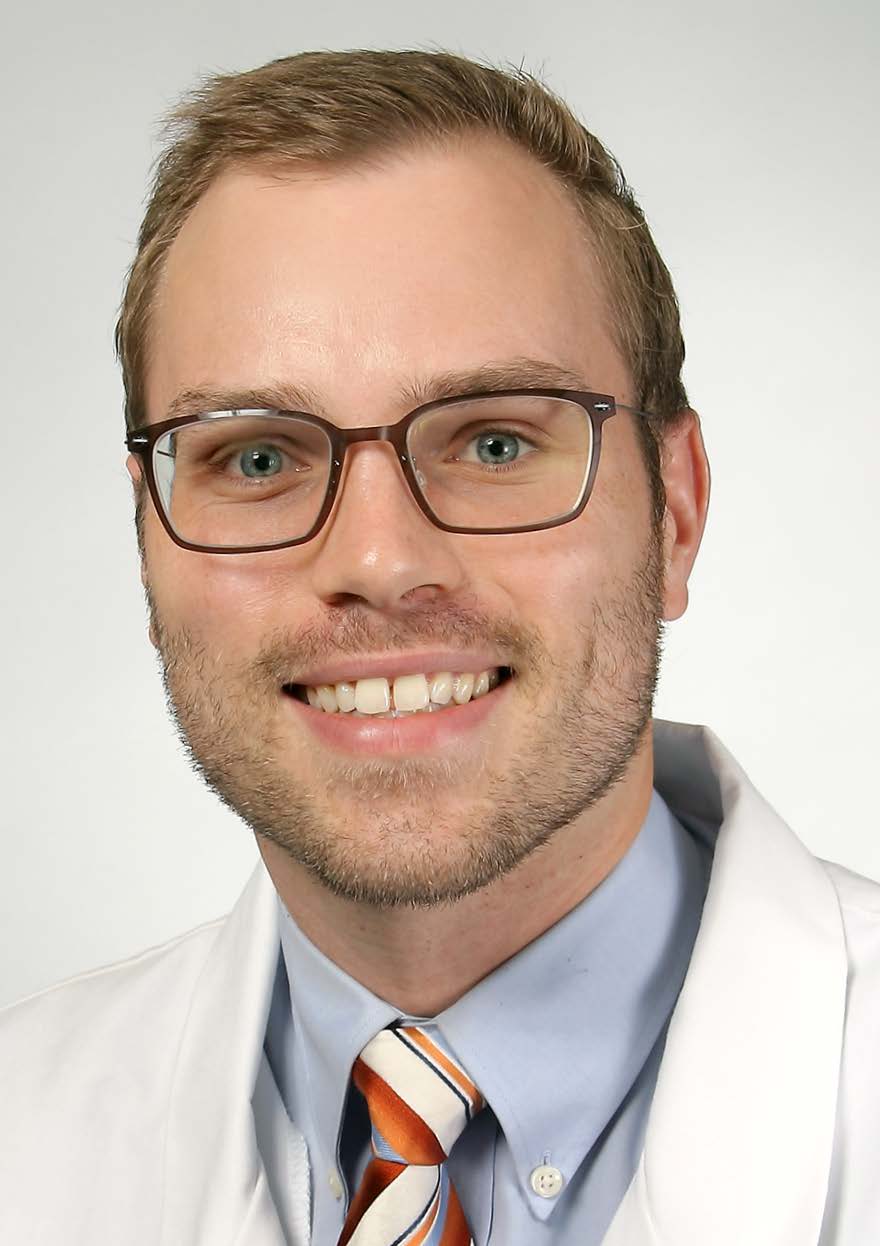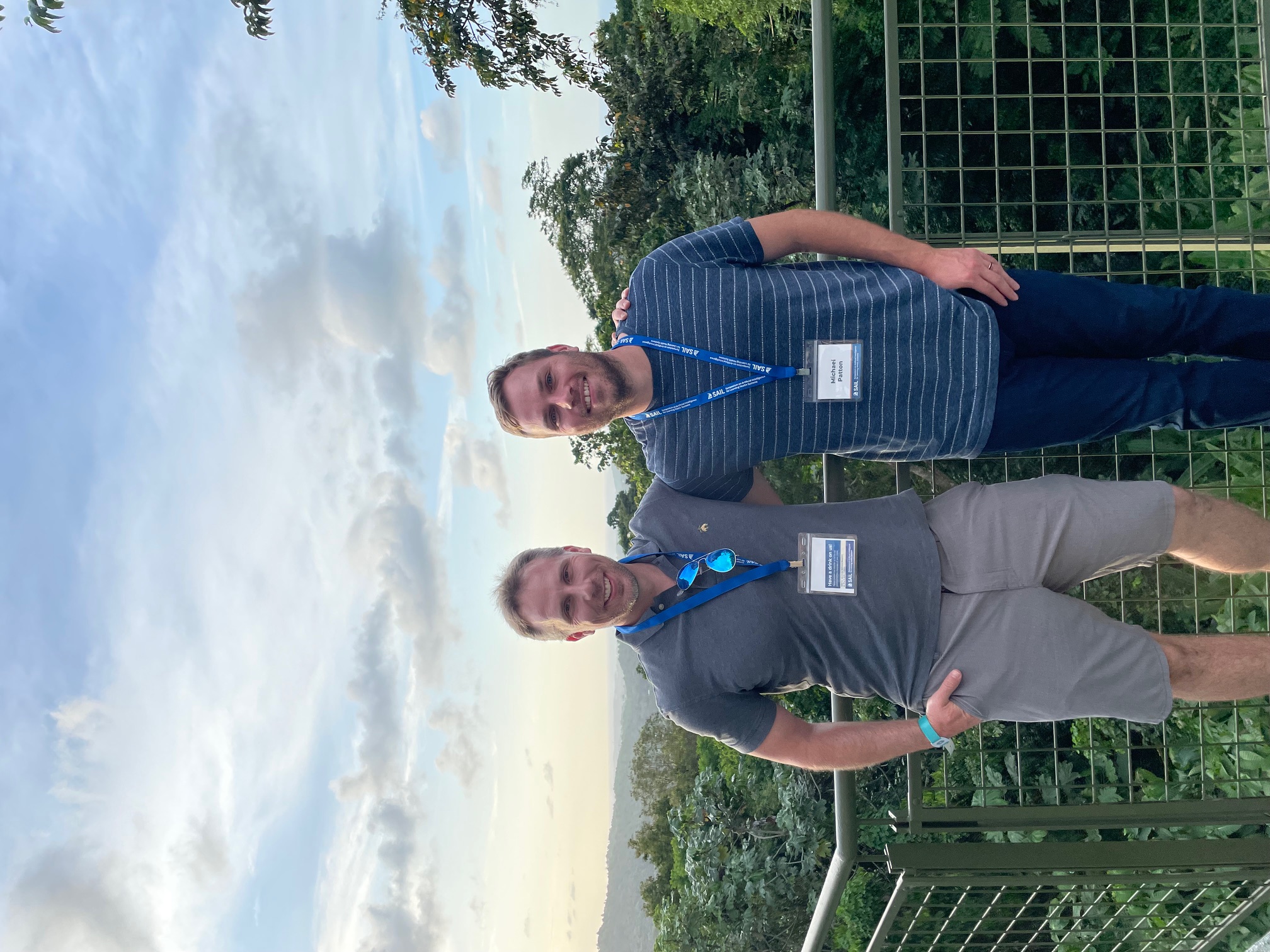 Michael Patton, Ph.D.Michael Patton, Ph.D., a student in Heersink’s Medical Scientist Training Program (MSTP), recently defended his doctoral dissertation, an achievement that moves him one step closer to becoming a physician-scientist. His work with the Hugh Kaul Precision Medicine Institute (PMI), under the mentorship of Matt Might, Ph.D., director for PMI, and William Byrd, Ph.D., associate director for PMI, played a central role in his Ph.D. journey.
Michael Patton, Ph.D.Michael Patton, Ph.D., a student in Heersink’s Medical Scientist Training Program (MSTP), recently defended his doctoral dissertation, an achievement that moves him one step closer to becoming a physician-scientist. His work with the Hugh Kaul Precision Medicine Institute (PMI), under the mentorship of Matt Might, Ph.D., director for PMI, and William Byrd, Ph.D., associate director for PMI, played a central role in his Ph.D. journey.
“Put simply, Matt changed my life all for the better and was the best mentor a student could ever ask for,” Patton said. “He is a rare combination of superhuman and humble human.”
Patton’s Ph.D. research focused on improving PMI’s artificial intelligence tool, mediKanren, and understanding COVID-19 disease mechanisms, risk-factors for severe disease, and treatment options using biomedical data. He began his time at PMI by studying computer science fundamentals and attending weekly case reviews for rare and undiagnosed patients, an experience that profoundly shaped his perspective.
“Before I knew it, Dr. Might and Dr. Byrd rewired the way I think about problems and used Scheme and Racket programming languages to teach me the fundamentals of computing,” Patton said. “The combination of this training with a weekly case review focused on identifying therapeutic solutions for patients who had fallen through the cracks of modern medicine was exactly what I was looking for.”
When the COVID-19 pandemic began in 2020, Patton shifted his research focus from rare diseases to the urgent challenges of the new virus.
“I asked Dr. Might if I could change my entire Ph.D. trajectory from rare-disease genomics to AI development, biomedical informatics, and outcome modeling with electronic medical record data from COVID patients,” Patton said. “By the end of April, Dr. Might had paved the way for PMI access to the UAB medical record system for COVID admissions.”
This pivot led to multiple studies. One analysis of >10,000 COVID-19 patients from >50 hospitals and clinics across the UAB and Ochsner Louisiana Health Systems found that bacterial coinfections significantly increased the risk of ICU admission, mechanical ventilation, and in-hospital mortality. Patton also identified an “elevated neutrophil-to-lymphocyte ratio (≥15) within 48-hours of hospitalization” as a reliable early biomarker for those coinfections.
Another study examined Long COVID patients at UAB and found “evidence for a new type of pulmonary fibrosis in Long COVID, defined by impaired diffusion and restrictive lung patterns,” Patton said. He added that “invasive ventilation during initial COVID-19 hospitalization” was a primary risk factor for developing this condition.
As the Ph.D. phase came to a close, Patton and Might were able to complete several AI projects put on hold during the pandemic. “Large language models really are the future of automation for medical record analysis, linking unstructured free-text from medical provider notes to structured medical data like vitals, labs diagnostics, and CT/MRI/Ultrasound imaging will significantly improve the fidelity of translational studies,” said Patton. These efforts resulted in a Spotlight Presentation and New England Journal of Medicine Scholarship at the Symposium for Artificial Intelligence and Learning Health Systems (SAIL). “Looking back, it's hard to believe that a five-year Ph.D. came and went so fast,” Patton said. “I just count myself lucky to have had Dr. Might in my corner for half a decade.”
 Matt Might, Ph.D. with Michael Patton, Ph.D.Now, back in the clinical phase of the MSTP, Patton is completing his final year of medical school. “Returning to the hospital and working with patients again just gives me energy, I’m fired up for the next phase in training,” he said. “With each day of clinical exposure, my desire to continue AI and informatics research has only grown stronger and more nuanced,” Patton added. “I’ve got my heart set on internal medicine research-track residency programs. Applications season is around the corner and I’m incredibly excited for the next step.”
Matt Might, Ph.D. with Michael Patton, Ph.D.Now, back in the clinical phase of the MSTP, Patton is completing his final year of medical school. “Returning to the hospital and working with patients again just gives me energy, I’m fired up for the next phase in training,” he said. “With each day of clinical exposure, my desire to continue AI and informatics research has only grown stronger and more nuanced,” Patton added. “I’ve got my heart set on internal medicine research-track residency programs. Applications season is around the corner and I’m incredibly excited for the next step.”
Beyond medicine, Patton is also navigating a new phase of life at home.
“My wife Haley and I are now in full chase mode for our increasingly clever 18-month-old daughter Hazel Ann,” he said. “If I'm being honest, I've never been more exhausted in my life, and I wouldn't change a minute of it. I'm a hollow husk without my girls.”
Patton will earn his M.D. after completing two more years of medical school. Wherever his path leads, he knows the impact PMI and Might have had on his life and career.
“I'll never forget our time programming together, attending conferences, presenting our research, and repeatedly revising a collective opinion that Star Trek Next-Generation really doesn't hit its stride until the end of Season 3.”